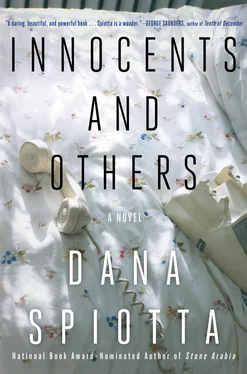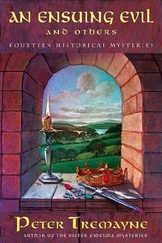The blurry film is slowed down until the images become stills and frame lines appear. Meadow’s voice speaks over the images. “All films are a kind of hallucination — the way we see twenty-four static images a minute as movement. The speed tricks the eye, and the eye fills in what is missing. The form constant delusion.” The images speed up and slowly come into focus. They are from Francis Coppola’s film The Conversation. Gene Hackman is destroying his apartment, looking for a microphone. Nicole’s voice is heard as Hackman methodically peels his wallpaper down.
“After Oz left, I went to the Cineplex all the time. I went through the TV Guide and I circled films I had to watch. I would stay up all night sometimes.” Now the images are of another film, black and white, what is it? Agnès Varda’s Cléo from 5 to 7. “My other pastime was to call men and have conversations with them. More than a pastime. My vocation was calling men. You know that word, vocation , means a calling? Calling was my calling.”
“Strangers?”
“Yes, I had learned cold-calling from my sales job, but I did this for no real reason. Not money, anyway.” Her voice trails off. A close-up of stacks of cards by a phone. Then a close shot of a woman’s hand dialing, a little animation of phone lines across America. “One day an opportunity came up for me to combine my pastimes.”
Meadow’s camera moves slowly toward an artfully lit Rolodex. No shots of this woman. Soon, Carrie thought, she will have to show her.
The film cuts to the talking heads of the men. Three middle-aged guys, all successful in the entertainment business. All talking about this girl who called them, Nicole. Each one describes his phone connection in sequence, showing how Nicole used a kind of formula on the men. Through the manipulating of the men and the repetition of her technique, Nicole starts to emerge as a con artist.
The three of them talk about wondering what she looked like, even though they sensed an issue there. A black screen returns but with an intertitle: After weeks of being interviewed off camera, Nicole finally agreed to be filmed. Then a cut to the first full view of Nicole. She walks down the street with a small dog on a leash. She looks older than her voice and has a lumpy white body that wears its years heavily. Her blouse is a little too tight, with slight gaps where her body strains between the buttons. Watching Nicole walk made Carrie feel weary. She could see where this was going. A clean cut to Nicole on her couch in a blue kimono, a more flattering view. She isn’t ugly at all, Carrie thought, and Meadow has lit her nicely. Her blond hair frames her face in fragile wisps, but the hair is styled, smooth. Her made-up face is round and clear, her eyes and her mouth are pretty in a puffy, tender way. She is a somewhat attractive, large-bodied fiftyish woman. But she is far from beautiful. As she talks, she becomes more lovely, her voice smooth and just on the edge of throaty. She laughs, and it is a delicate, soulful-sounding laugh.
“Jack was different for me, the last person I had a call”—she paused, looked around for a word, smiled—“thing with.”
Meadow’s voice from off camera. “What happened, why was Jack different?”
Another long pause. It was great the way Meadow let people pause, let them say nothing. And that she included her question in the film. Carrie hated when the pauses got cut out. “I really fell in love with Jack”—an L cut to Jack in his kitchen while Nicole talks—“and I think he fell in love with me. I mean, I know he did.” He is making some coffee with a French press. While he waits for the coffee, he lights a cigarette. The sound is now no longer Nicole’s voice. It is Jack lighting up. And having a coughing fit. He is also older, easily sixty. He has a full head of gray hair and wears a black sweater. He looks attractive in a dissipated way. Lots of wrinkles from smoking, a jawline weakened by age. He laughs at his coughing fit, then he talks about Nicole. He says it was a long time ago, but you can see he is still upset as he describes his attachment to her. He says he persuaded her to meet him. Meadow cuts to Nicole, who talks about how she sent a photo of her friend, which meant she could never meet Jack.
“Why didn’t you send a picture of yourself?”
“Look at me,” she said. “Do I look like anyone’s fantasy?”
“Why a fantasy?”
“Because that is what I enjoyed, imagining myself like that. It is for me as much as them.”
“But they don’t know that.” Another pause. She looks wavy, and her face colors. She looks a little emotional. Shamed. That’s the word. Carrie didn’t want Meadow to keep at Nicole.
“It was different with Jack. I let myself be myself more and more with him. Under different circumstances, we were very compatible.”
Now it is Jack’s turn: Meadow shows him in Malibu, walking on the beach. It interested Carrie, where the film was going, however obvious its point; how enslaved we are by our bodies, our selves concealed. How much are we our bodies? And why is it so different for women? Why is Nicole’s tumid, faded person so much less appealing than worn, old Jack? And it isn’t just success or money. It is men and women. Carrie felt a heat rise in her face.
Carrie was watching Meadow’s film, but she was also thinking about her own life, her own disappointing body. She was barely thirty-two, and already she could read it in the faces of the interesting men she met. She would be having a great conversation with another filmmaker. Someone her age, someone with a comparable amount of success. Not even actors, for god’s sake. Just male equivalents of her, people behind the camera and not built for glamour. And she would feel a rapport. Then they would say, I want you to meet my wife. Or, here is my girlfriend. And out she would come, so young and perfect. Breathtakingly attractive. Not stupid by any means. Full of admiration and adoration. Why should these men get it all? It was such a cliché. And what did Carrie get? A tired, frustrated husband she had no idea how to please anymore. Things were going so well for her, and yet she knew she was slowly losing him. Carrie’s eyes blurred.
Next, the film settles into a straight monologue from Jack that doesn’t get intercut with Nicole. Meadow’s presence is felt even though she doesn’t say anything; she is who he is talking to. The camera is Meadow, and the waiting is the question. One of Meadow’s favorite techniques.
Jack tells the story of being stood up by Nicole. He sits on his white couch. His legs are crossed and he lights a cigarette. “I’m over it now, but for years I tried to figure it out. I am not a player, you know? Not like a lot of men I know. I’m divorced, I work a lot. It’s an old story. Nicole listened to me, and I think I made her feel good. I liked that I could. I’m a little cynical and rough around the edges, but there was something about her voice on the phone. She didn’t interrupt me. She told me about her life, and I told her about mine. I wanted to meet her. Actually, I wanted to be with her. Change my life, whatever it took. I never felt that way before.”
A pause and Jack’s eyes look to the side, then back to the camera.
“I thought she was a student at Syracuse University, interested in the film industry. I think I thought she grew up here — she seemed to know everyone. I don’t know — there wasn’t a lot of backstory with details. She elided details; we talked about movies and music. Our childhoods. She was very intelligent and kind.” He shrugs. “Okay, kind until the end when she stood me up and disappeared.”
Jack lights a cigarette, sighs, and exhales. “I wanted to meet her in person. She seemed to want to meet me. She sent me these photos of herself.” Now Meadow finally cuts away and old snapshots fill the screen: a beautiful woman in a bathing suit, clearly not Nicole, not even young Nicole.
Читать дальше












